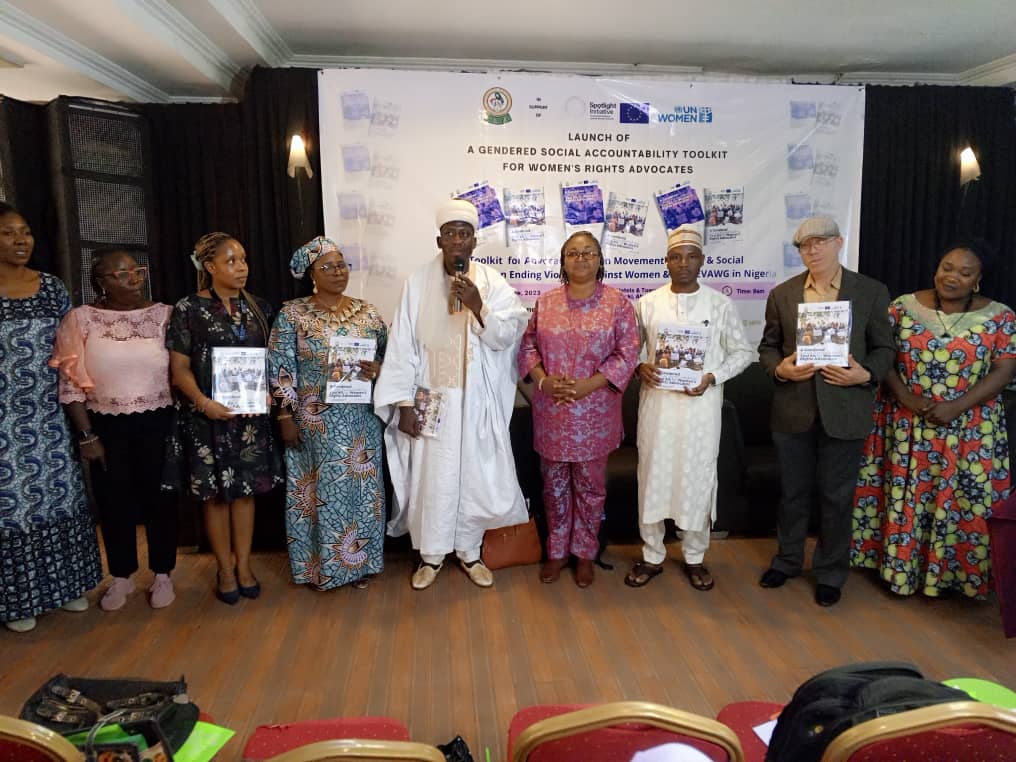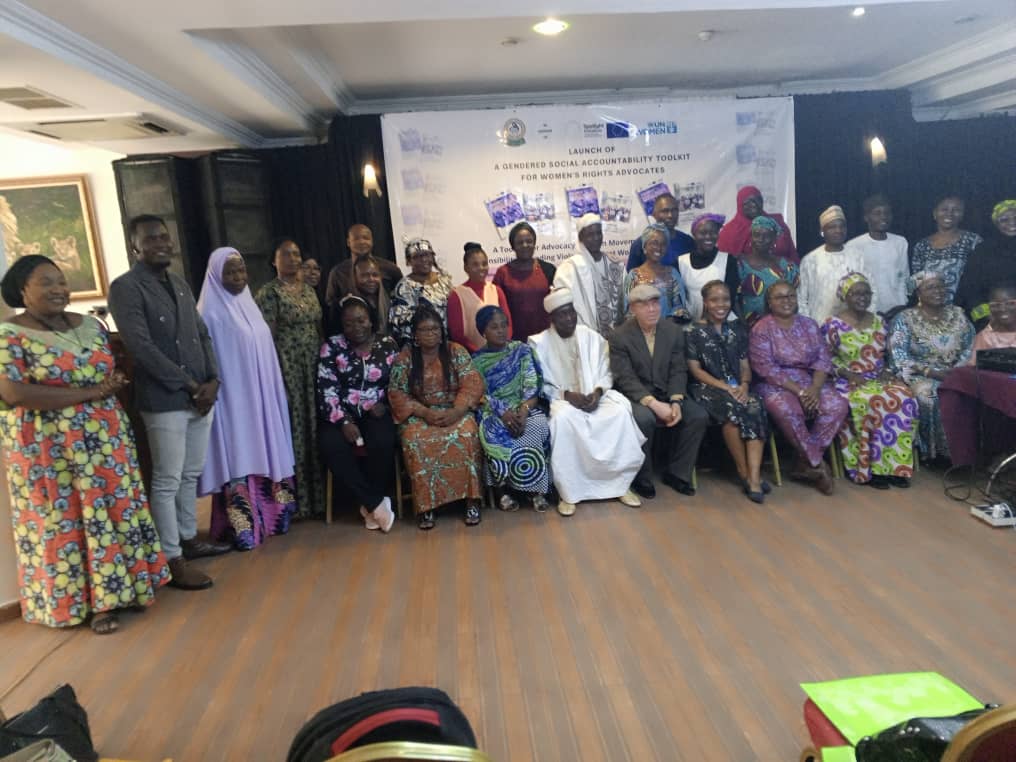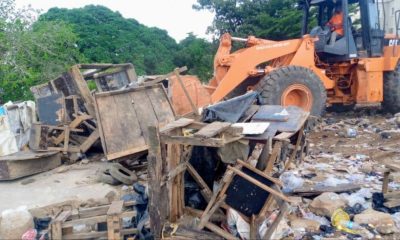NEWS
Stakeholders Launch Social Accountability Toolkit for Structural SGBV Intervention

By Prosper Okoye
Stakeholders in the battle against Sexual and Gender-Based Violence (SGBV) have unveiled a social accountability (SAC) toolkit and mentoring manual to facilitate a structural approach to SGBV interventions in Nigeria.
During the launch on Monday, Yemisi Nathaniel, Senior Executive Programs Coordinator at Women’s Right Advancement and Protection Alternative (WRAPA), informed journalists that grassroots organizations from FCT, Adamawa, and Sokoto states, gathered through the Spotlight Initiative pillar partnership, would utilize the toolkit as a guide for advocacy and accountability mechanisms in their respective communities.
Angela Muruli, the Technical Coherence Officer of United Nations Women, shared a goodwill message expressing her joy and pride.
She stated that the project, spearheaded by WRAPA, has finally come to fruition.“UN Women, through their EU-UN Spotlight Initiative, is delighted to have partnered with WRAPA for the past four years on this flagship program. In 2017, the EU recognized that ending violence against women and girls is crucial for sustainable development. Consequently, they launched an ambitious grant of nearly 500 million Euros, the largest funding ever provided by a global entity to address violence against women and girls. UN Women and the UN country teams were entrusted with rolling out the EU Spotlight Initiative project.
“Thus, we embarked on the Spotlight Initiative with six main outcome areas, which many of you are familiar with. These areas include legislation, strengthening institutions, prevention services, data, and, of course, the women’s movement, which WRAPA has championed beautifully.
“The Spotlight Initiative has achieved significant milestones, such as the passage of the Violence Against Persons Prohibition (VAAP) Act in over 90 percent of the states in Nigeria. More recently, we successfully advocated for the passage of the sexual harassment bill, and I want to applaud WRAPA for this achievement. We have also championed the establishment of one-stop centers and galvanized a strong women’s movement, instrumental in driving the passage of gender bills, as witnessed in March last year in the National Assembly.
“I have had the privilege of getting a sneak peek into the toolkit. For those who haven’t seen it yet, let me assure you it is impressive. It is rich with experiences and serves as a practical tool to empower all of us in this room to champion the cause established by your esteemed organization…” Angela, who represented Ms. Beatrice Eyong, UN Women Representative to Nigeria and ECOWAS, conveyed to the audience.
Furthermore, stakeholders, while sharing their success stories on the project, expressed frustrations encountered during the interventions. One of their primary complaints was the attitude of the Nigerian Police Force when a case is reported to them.
“Whenever you report a case, they expect you to pay for a pen, files, transportation for the victim, the accused, and even for the police officer handling the case. You have to foot practically every expense, and this discourages us and most of the victims from pursuing justice,” lamented Farah James of ASWHAM, Adamawa State.
Afam Kasim of TAF Africa, representing the organization’s Director, Jake Epelle, advised that increased advocacy could help address most of the challenges.
“Identifying the individuals who can bring about change in the areas you are working in can be helpful. I remember around 2015 or thereabouts, individuals with Albinism were dying in the national hospital due to skin cancer, and we were seeking funding. We identified that there was something known as a service-wide vote, so we approached Ngozi Okonjo-Iweala as an organization. These are Nigerians; they did not develop skin cancer by choice but rather due to the unique nature of their skin. When we presented our case to her, she had no reason but to release 17 million Naira to the National Hospital, all because we knew whom to approach,” he said.
However, Daniel Johnson of the African Youth Union Commission raised concerns about the significant reduction in recent budgetary allocation to the Ministry of Women Affairs, an agency of the government tasked with intervening in cases of sexual and gender-based violence (SGBV) affecting women and girls.
“Our organization conducted a fact-finding mission at the National Assembly to assess the readiness of the budget, particularly the gender-responsive bill and other issues concerning women and girls. To our shock, the 2022 budget for the Ministry of Women Affairs was approximately 35 billion Naira. However, in 2023, it was reduced to 17.1 billion Naira, representing a reduction of about 54 percent. We have been urging them to explain the reason for this cut. Does it imply that women do not face any problems? Moreover, this has also impacted the allocation for SGBV interventions,” he stated.
Kaneng Rwang-Pam, SAC Toolkit Design Consultant, emphasized the comprehensiveness of the kit in addressing practical issues that may arise in the field. She encouraged participants to have an open mind and adapt the solutions provided in the book to overcome their specific challenges.
“The Social Accountability Toolkit is dedicated to achieving tangible results. It involves engaging critical stakeholders who make decisions that propel our communities forward. The toolkit comprises mechanisms and strategies for gathering information and involving stakeholders to advance gender equality, eliminate discrimination against women and girls, and end violence in all its forms.
“Furthermore, the toolkit is versatile and can be applied in various contexts. In this particular instance, it supports efforts to end violence against women and girls, which aligns with SDG 5 as the primary target.
“In essence, it strives to achieve equity in our homes, communities, states, and nation at all levels, encompassing the fair distribution of state resources. This impacts sectors such as health, education, agriculture, and every aspect of the daily lives of women and girls in Nigeria.
“The toolkit includes a case study that highlights the negative impact on women’s lives in a specific community where a lack of accessible healthcare centers forces them to travel long distances. Pregnant women, for example, face complications and higher mortality rates. Advocacy efforts were undertaken to address this issue and find a solution.
“In another case, a particular local government failed to allocate sufficient resources, unaware of the need for increased funding for a primary health center to ensure community members, especially women, can access quality healthcare. The toolkit provides practical methods to facilitate such changes and more,” she explained in an interview with DAILY ASSET.
Additionally, Precious Anslem, FCT WRAPA Spotlight Initiative Project Officer, encouraged participants to assess their progress through regression analysis and realize the significant achievements made. Therefore, he urged them not to lose faith in their cause due to challenges.
“While you may have set out to achieve five things, even accomplishing one is progress,” he said.
Chief Dauda Dogo of Karomajigi community in Abuja, the Chief Launcher of the toolkit, issued a resounding call for increased collaboration in the fight against sexual and gender-based violence targeting women and girls. He passionately urges both the government and society to actively promote and utilize the tool.

NEWS
FG Imposes 7-year Ban on New Federal Tertiary Institutions

The Federal Executive Council (FEC) has approved a seven-year moratorium on the establishment of new federal tertiary institutions.
Dr Tunji Alausa, Minister of Education announced the approval, after Wednesday’s FEC meeting, presided over by President Bola Tinubu at the Presidential Villa, Abuja.
He explained the ban applies to all federal universities, polytechnics, and colleges of education.
According to Alausa, the decision aims to address systemic decay caused by unregulated expansion.
”What we are witnessing today is duplication of new federal tertiary institutions, a significant reduction in the current capacity of each institution, and degradation of both physical infrastructure and manpower.
”“If we do not act decisively, it will lead to marked declines in educational quality and undermine the international respect that Nigerian graduates command.”
“We are doing this to further halt decays in tertiary institutions which may in future affect the quality of education and consequently cause unemployment of graduates from some of these institutions.”
Alausa noted Nigeria currently has 72 federal universities, 108 state universities, and 159 private universities with similar trends in polytechnics and colleges of education.
He pointed to a growing mismatch between the number of institutions and available student enrollment.
He cited a northern university with fewer than 800 students but over 1,200 staff, calling it unsustainable.
The minister described the moratorium as a bold corrective measure by the Tinubu administration.
He said the government would now focus on upgrading existing institutions, improving infrastructure, boosting manpower, and increasing capacity.
“We need to improve the quality of our education system and increase the carrying capacity of our current institutions so that Nigerian graduates can maintain and enhance the respect they enjoy globally.”
The minister however announced that the Council approved 9 new private universities out of the 79 active requests pending applications.
”Several of these applications have been in the pipeline for over six years, with investors having already built campuses and invested billions of Naira,” he explained.
“Due to inefficiencies within the NUC, approvals were delayed. We have since introduced reforms to streamline these processes, and today’s approvals are a result of clearing this backlog.”
(NAN)
Foreign News
CAF Sanctions Kenya Again over Crowd Trouble

The Confederation of African Football (CAF) has sanctioned African Nations Championship (CHAN) co-host, Kenya, for the second time in as many weeks over security breaches.
In a statement made available on Monday evening, the continental governing body said that it has limited entry to the 48,000-seat Moi International Sports Centre.
It also said that, known as Kasarani Stadium, can accommodate 27,000 fans for Sunday’s Group A match between Kenya and Zambia.
CAF said only electronic ticket holders would be allowed into the stadium, with thermal tickets prohibited.
The governing body warned that Kenya’s matches could be relocated from Kasarani Stadium if organisers fail to prevent further breaches.
“We trust these measures will be applied swiftly to protect competition’s integrity, ensure fan safety, and uphold confidence in Kenya’s commitment to the tournament,” CAF said.
The sanctions follow incidents on Aug. 10 when Kenya defeated two-time winner Morocco 1-0 in spite of playing the entire second half with 10 men.
The win put Kenya top of Group A with seven points.
The debutants would reach the quarterfinals with at least a draw against winless Zambia.
Last week, Kenya’s football federation was fined nearly 20,000 U.S. dollars for security lapses during the team’s 1-0 win over DR Congo in the tournament opener on Aug. 3.
In the latest case, CAF cited major lapses, including stadium gates and restricted service areas being overrun by ticketless spectators and holders of government-distributed physical tickets.
It also accused security personnel of losing control at exit points and allowing breaches of the perimeter fence that enabled thousands of ticketless fans to enter.
CAF had expressed alarm over the use of tear gas and flash grenades, reports of live ammunition fired near spectators and staff, and violent incidents such as stone-throwing at security personnel.
It also cited unsafe vehicle movement in spectator areas, inadequate police response, and the lack of medical incident reports in spite of injuries being reported.
Organisers were further criticised for insufficient communication tools and the absence of CCTV coverage at critical entry points.
Education
Varsity Don Advocates Establishment of National Bureau for Ethnic Relations, Inter-Group Unity

By David Torough, Abuja
A university scholar, Prof. Uji Wilfred of the Department of History and International Studies, Federal University of Lafia, has called on the Federal Government to establish a National Bureau for Ethnic Relations to strengthen inter-group unity and address the deep-seated ethnic tensions in Nigeria, particularly in the North Central region.
Prof.
Wilfred, in a paper drawing from years of research, argued that the six states of the North Central—Kwara, Niger, Kogi, Benue, Plateau, and Nasarawa share long-standing historical, cultural, and economic ties that have been eroded by arbitrary state boundaries and ethnic politics.According to him, pre-colonial North Central Nigeria was home to a rich mix of ethnic groups—including Nupe, Gwari, Gbagi, Eggon, Igala, Idoma, Jukun, Alago, Tiv, Birom, Tarok, Angas, among others, who coexisted through indigenous peace mechanisms.
These communities, he noted, were amalgamated by British colonial authorities under the Northern Region, first headquartered in Lokoja before being moved to Kaduna.
He stressed that state creation, which was intended to promote minority inclusion, has in some cases fueled exclusionary politics and ethnic tensions. “It is historically misleading,” Wilfred stated, “to regard certain ethnic nationalities as mere tenant settlers in states where they have deep indigenous roots.”
The don warned that such narratives have been exploited by political elites for land grabbing, ethnic cleansing, and violent conflicts, undermining security in the sub-region.
He likened Nigeria’s ethnic question to America’s historic “race question” and urged the adoption of structures similar to the Freedmen’s Bureau, which addressed racial inequality in post-emancipation America through affirmative action and equitable representation.
Wilfred acknowledged the recent creation of the North Central Development Commission by President Bola Tinubu as a step in the right direction, but said its mandate may not be sufficient to address ethnic relations.
He urged the federal government to either expand the commission’s role or create a dedicated Bureau for Ethnic Relations in all six geo-political zones to foster reconciliation, equality, and sustainable development.
Quoting African-American scholar W.E.B. Du Bois, Prof. Wilfred concluded that the challenge of Nigeria in the 21st century is fundamentally one of ethnic relations, which must be addressed with deliberate policies for unity and integration.





























